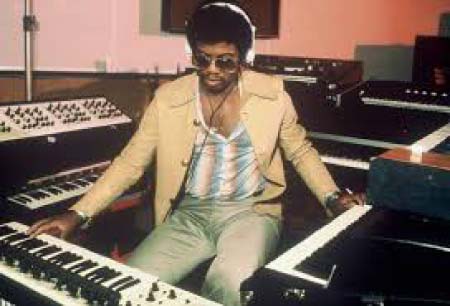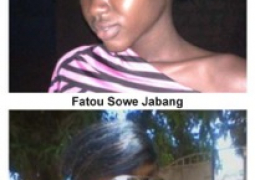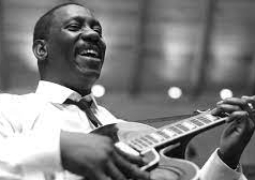
It is music that assembles the influence of hard bop modal jazz, the avant garde and free jazz, without necessarily being immediately identifiable as any of the above. Musicians who have been associated with this sound are John Coltrane, Miles Davis, Charlie Mingus, Wayne Shorter and Herbie Hancock.
His birth name is Herbert Jeffrey Hancock, but later known as Herbie Hancock. He was born in Chicago, Illinois, U.S.A on April 12th 1940, and got introduced to music with a classical music education at the age of seven. He was considered a child prodigy when at the age of eleven; he played the first movement of Mozart’s Piano Concerto No 5 at a Young People’s Concert with the Chicago Symphony. He is an American pianist, bandleader and composer whose music embraces elements of funk and soul while adopting freer stylistic elements from jazz in his musical improvisations. He possesses a unique creative blend of jazz, blues and modern classical music with harmonic styling that crosses over without restriction. He is best known for his solo works “Cantelope Island” “Watermelon Man” “Chameleon” “I thought it was you” and “Rock It”.
Herbie never had a jazz teacher but developed his listening capacity and sense of harmony through intense hard work and dedication to music. He was greatly influenced by the sound of a vocal group called “The High Lo’s” who were produced by Clare Fisher, a music arranger. Hancock would later explain that Clare Fisher was a major influence on his harmonic concept. He also worked with and under the direction of Chris Anderson who he referred to as his harmonic guru. In 1960, while working with Anderson, Herbie met Donald Bryd and Coleman Hawkins and also began working with them and at the suggestion of Donald Byrd, he started studying composition with Vittorio Giannini.
His reputation quickly grew and he played sessions with Oliver Nelson and Phil Woods recording his first solo album –“Takin Off” which caught the attention of Miles Davis who was at that time putting together a new band. Herbie was introduced to Miles by the young drummer of Miles’s new band, Tony Williams and in 1962, he joined Miles’s “Second Great Quintet”. This was a time when Miles was surrounding himself with fresh new talent and was excited to have Herbie on his team, considering him one of the most promising talents in jazz. The rhythm section Miles was organizing was young but effective, comprising bassist Ron Carter, seventeen year old drummer Tony Williams and Hancock on piano. Initially, George Coleman and Sam Rivers took turns on saxophone, but the quintet would finally settle down with Wayne Shorter on tenor saxophone. This Quintet is usually regarded as one of the finest jazz ensembles ever and provided Herbie with the opportunity to find his own voice as a pianist. While with Miles’s band, he would also record dozens of sessions as a sideman for other musicians and under his own name.
In 1964, he recorded the album ‘Empyrean Isles’ and in ‘65 he recorded another album ‘Maiden Voyage’. These two albums were to be two of the most famous and influential jazz LPs of the sixties winning praise for their innovation and accessibility. Both albums were regarded as among the principal foundations of the post-bop style. Hancock also recorded several less well known albums with larger ensembles – ‘’My Point of view’’ (1963),’’Inventions and dimensions’’ (63), “Speak like a child” (68) and “The Prisoner” (1969).
After leaving Miles’s band, Herbie formed his own sextet, but continued to appear on Miles records, making noteworthy appearances on the albums “In a Silent Way”, “A tribute to Jack Johnson” and “On the Corner”. In the 70’s he would experiment with electric instruments and was one of the first jazz pianist to completely embrace electronic keyboards. His new band included Buster Williams on bass, drummer Billy Hart and three horn players making it a sextet.
This group would later expand into a septet and went on to record three experimental albums under Hancock’s name – Mwandishi in 1971, Crossings in 1972, and Sextant in 1973, these releases became known as the “Mwandishi” albums and although now noted and respected as early fusion recordings, they received mixed reviews at that time.
Herbie’s fascination and love for funky music would grow with influences from Sly Stone’s music and his hobby of collecting electronic musical gadgets. He would later gather a new band to explore that funky feeling. The band was called “Head Hunters” and he released the album bearing the same name in 1973. It became a major hit and crossed over to popular audiences but was also criticized by some jazz fans and critics who thought that the album was too commercial. In 1973 he also recorded the sound track of the movie “The Spook Who sat by the Door”. Herbie’s next jazz funk albums were “Man-Child” (1975) and “Secrets” (1976)
During the late seventies and early eighties, Hancock toured and recorded with his Quintet “V.S.O.P.” which featured all the former members of the Miles Davis Quintet of the sixties except Davis himself who was replaced by Freddie Hubbard. Together they recorded several live albums “V.S.O.P.” in 1976 and VSOP the Quintet in1977. In 1978, he recorded a duet with Chick Corea and also released a solo acoustic piano album titled “The Piano”. From 1978 to 1982, Herbie recorded many albums consisting of jazz infected disco and popular music. However, he also found time to record more traditional jazz while continuing to create commercially oriented music. In 1981 he toured and recorded with tony Williams and Ron Carter, releasing a five track live album entitled “Herbie Hancock Trio”. Later that year, he joined Williams and Carter to tour with Wynton Marsalis and his brother Branford in what was known as “V.S.O.P. 11”
Lesser known works by Herbie from the eighties are the live album “Jazz Africa” and the studio album “Village Life” which were recorded with Gambian Kora player Foday Musa Suso who was based in Chicago at that time. In 1968, he performed and acted in the film “Round Midnight “and later that year he left Columbia Records after more than a fifteen years relationship. After leaving Columbia Records, Herbie toured with Jack DeJohnette, David Holland and Pat Matheny in 1990 and performed at the Montreux Jazz Festival in July of the same year. In 1997, he did a duet album with Wayne Shorter titled 1+1 and in 1998 he released the album “Gershwin’s World”.
In 2001, he reunited with long time producer Bill Laswell and recorded the album Future 2 Future. Later that year, he partnered with Michael Brecker and Roy Hargrove to record a live album saluting Miles Davis and John Coltrane called “Directions in Music” – Live at Massey Hall. Four years later, he was busy again in 2005 and recorded another duet album entitled “Possibilities”, featuring Carlos Santana, Paul Simon, Sting and others. In 2006, the BMG Record label which had bought out Hancock’s old record company- Columbia, released a two disc compilation – “The Essential Herbie Hancock”. In 2007, he released the album “River-The Joni Letters”, which paid tribute to his longtime associate and friend –Joni Mitchell. In 2009, he performed at the – We are One Concert, marking the inaugural celebrations of President Barack Obama. In June 2010, Hancock released his Imagine Project Album featuring a host of musicians and singers from diverse backgrounds. Herbie continues to play and perform the world over and is now serving as the UNESCO goodwill ambassador for International Jazz Day which is celebrated on the 30th of April every year.
Unfortunately, because of the corona pandemic, the International Jazz Day will not be celebrated this year. We join the rest of the world in prayer, thought and determination to defeat this menace. We also urge all and sundry to abide by the dictates and advice from the authorities and respect social distancing as we continue to go about our businesses.
Listen to some jazz while staying home, it can make a difference.



